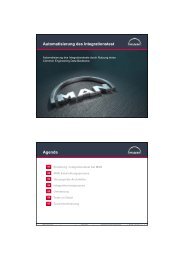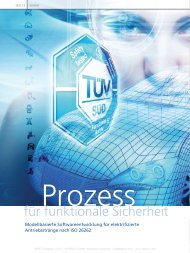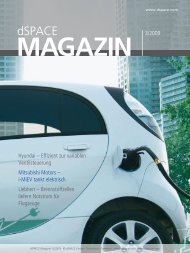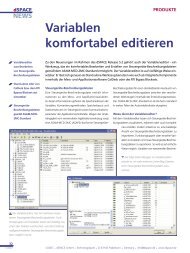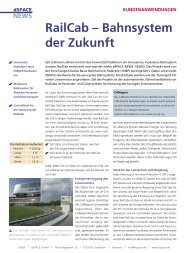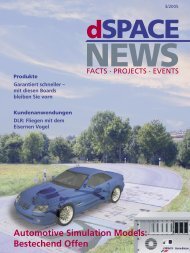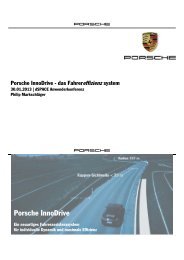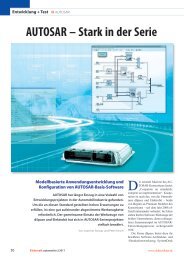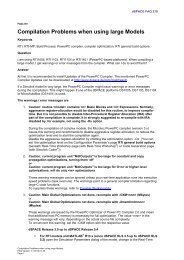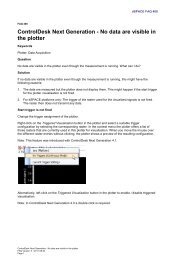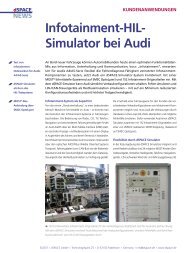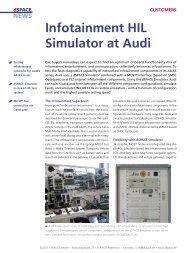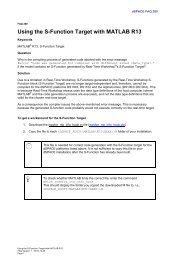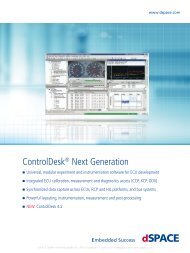magazinE - dSPACE
magazinE - dSPACE
magazinE - dSPACE
Create successful ePaper yourself
Turn your PDF publications into a flip-book with our unique Google optimized e-Paper software.
Eleven robot car teams out of the original hundred made it through to<br />
the finals of the DARPA Urban Challenge 2007. The winning team and<br />
three other finalists developed the control systems for their vehicles<br />
with <strong>dSPACE</strong> tools.<br />
The race on November 3, 2007 was<br />
the third competition held by the<br />
USA’s Defense Advanced Research<br />
Projects Agency (DARPA) as part of<br />
its program supporting the development<br />
of autonomous vehicles.<br />
Unlike the previous two competitions,<br />
which had the robot vehicles<br />
driving through the desert, this time<br />
the finals took place in an urban<br />
environment. The teams had less<br />
than 6 hours to negotiate a 100 km<br />
route along the suburban roads of<br />
the former George Air Force Base in<br />
Victorville, California, about 160 km<br />
north of Los Angeles. The vehicles<br />
were required to negotiate live<br />
traffic while obeying traffic laws and<br />
avoiding obstacles, and to compute<br />
a new route to their destination if<br />
roads were blocked. To mimic road<br />
conditions as realistically as possible<br />
and to simulate normal urban<br />
traffic, the driverless vehicles had to<br />
face 50 additional cars driven by<br />
stunt drivers.<br />
All the teams taking part in the<br />
DARPA Urban Challenge proved<br />
that autonomous vehicles can work.<br />
The teams developed their driverless<br />
vehicles in an amazingly short time,<br />
with the main focus on the further<br />
development of driver assistance<br />
systems.<br />
Successful Teams with dSPaCE<br />
involvement<br />
The winning team, Tartan Racing<br />
from Carnegie Mellon University,<br />
used <strong>dSPACE</strong> tools, and so did<br />
three other teams: TEAM CarOLO,<br />
Technische Universität Braunschweig,<br />
Germany; Team AnnnieWay,<br />
Universität Karlsruhe; Team Oshkosh<br />
Truck, Wicsonsin, USA.<br />
Team CarOLO, Technische<br />
Universität Braunschweig,<br />
germany<br />
The interdisciplinary Team CarOLO<br />
from the Technische Universität<br />
Braunschweig consists of five institutes<br />
from computer science, electrical<br />
engineering, and mechanical<br />
engineering, and includes 6 professors,<br />
10 other research associates,<br />
and 20 students. Together with<br />
students from the relevant university<br />
courses, the research associates<br />
conceived, designed, implemented,<br />
tested and optimized the concept<br />
and the software for an autonomous<br />
pAGe 29



